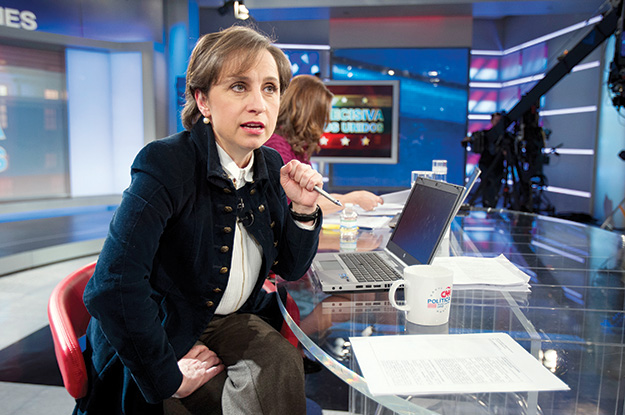This article is adapted from AQ’s print issue on youth in Latin America. See the rest of our Top 5 Latin American journalists.
Carmen Aristegui sweeps into an empty café in Mexico City, a beige trench coat draped across her shoulders and a look of fury on her face.
“Another one,” she says, shaking her head. “We lost another one.”
Days earlier, Javier Valdez became the sixth journalist to be killed in Mexico in 2017—pulled from his car and shot dead in broad daylight in Sinaloa state, an epicenter of drug violence. For Aristegui, Latin America’s most prominent investigative reporter and a constant thorn in the side of President Enrique Peña Nieto, the rash of murders is part of a bigger Mexican tragedy.
“We have a profound crisis of human rights, thousands of dead and disappeared, and at the same time a tremendous inability to judge these cases in court,” Aristegui told AQ. “It’s a big blanket of impunity that covers everything, and journalists are caught in the middle of that.”
As a result, Aristegui said, many journalists have resorted to self-censorship—which she called the “most effective tool of the powerful.” Asked why she thought Mexico, in many respects a modern country with a growing middle class, has been one of the world’s deadliest places for journalists, Aristegui cited the “authoritarian” legacy of one-party rule that ended only in 2000.
“It’s been a very slow transition,” she said. “We haven’t yet been able to create enough citizens who defend democracy.”
Aristegui has certainly done her part, uncovering a case in which a favored government contractor built a house for Peña Nieto’s family—which forced the president to apologize. She lost her job at a radio station following the investigation, in a firing many believe resulted from government pressure. But her profile has only grown since then, and she now hosts a show on CNN en Español.
What keeps her going, despite the threats and other challenges?
“You get pushed by the adrenaline—this is a lifestyle,” she said with a charming smile. “You’re on vacation, maybe you’re drinking a coffee, but then you see something and you think, ‘That’s a story!’”
“I like to tell stories. It’s a vital impulse—for me and, hopefully, others too.”






